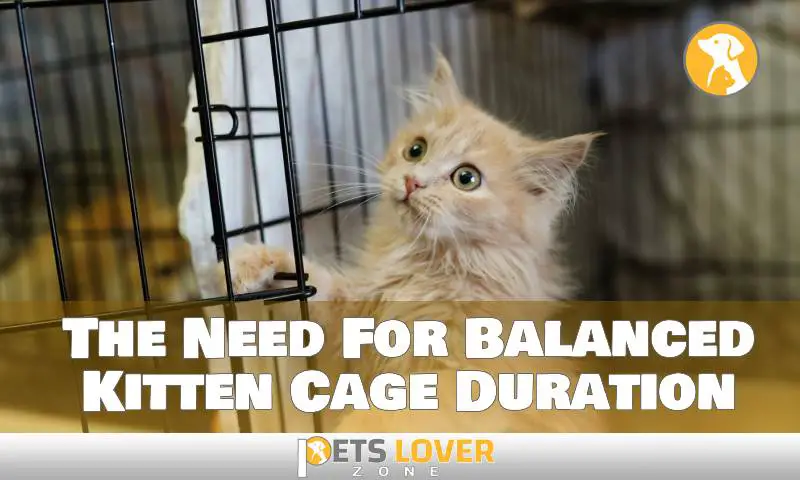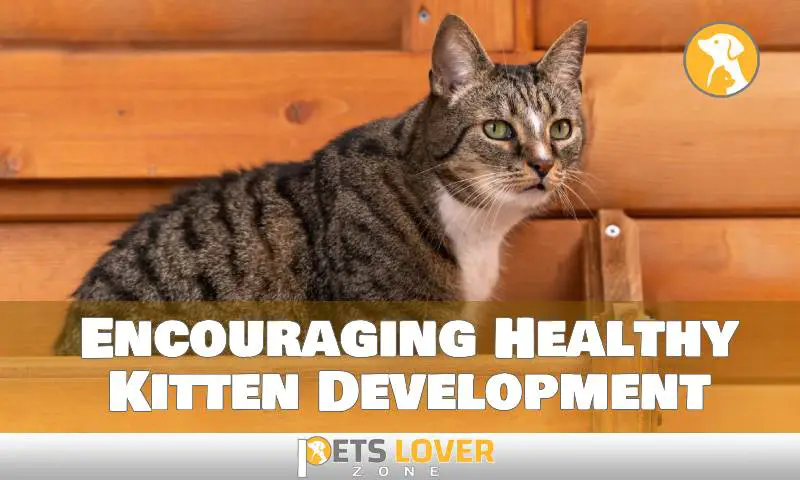A kitten should not be kept in a cage for more than a few hours at a time. It’s best to provide them with plenty of space and interaction to help them grow into healthy and happy cats.
As a responsible pet owner, it’s important to understand that caging a kitten for a long period of time can cause them significant stress. Kittens need to explore and interact with their environment to develop their cognitive and social skills. Therefore, keeping them in a cage for prolonged periods can affect their well-being and cause anxiety or depression.
In addition, kittens need proper nutrition, fresh water, and space to move around. It’s essential to create a safe environment for them to play and socialize with their humans and other pets. Hence, while it may seem convenient in some situations, caging a kitten for too long is not a recommended practice. Instead, pet owners can opt for training and positive reinforcement to help their kittens learn good behavior and improve their living conditions.
The Role Of Kitten Cage In Feline Health
Kitten cages play an important role in maintaining feline health. They provide safety, security and ensure that kittens do not wander off or get hurt. Cages also help prevent the spread of diseases between kittens, particularly when they are newly brought home.
It is best to keep kittens in cages only for short periods of time, ensuring that they have ample space to move around and play, as interaction is crucial for their growth and development. Kitten cages should be cleaned regularly, with food, water, and a litter box nearby for their convenience.
As kittens grow, they should be gradually transitioned out of the cage, allowing them to explore their surroundings freely while still maintaining a safe environment. Overall, the proper use of kitten cages can greatly contribute to the health and well-being of our feline friends.
The Psychological Effects Of Confining Cats
Keeping a kitten in a cage for too long can have serious psychological effects. Anxiety and stress are common among confined cats and can cause long-term damage. The feeling of being trapped can cause aggression and irritability towards their owners or other animals.
It is important for kittens to have regular playtime outside of their cages to avoid these negative effects. Owners should also provide a stimulating environment within their cages to keep their minds active. Remember to only use a cage as a temporary solution until the kitten is old enough to responsibly explore their surroundings.
Overall, it is vital to prioritize a kitten’s mental well-being to ensure they grow into happy and healthy cats.
The Need For Balanced Kitten Cage Duration

Kittens are naturally curious and playful, but their safety is key. Keeping a kitten in a cage can be necessary at times, but it’s essential to know how long is too long. The optimal duration for a kitten in a cage is usually around two to four hours a day, but this varies depending on age and acceptable stress levels.
Prolonged confinement can lead to physical and mental issues, such as anxiety and muscle atrophy. It’s crucial to provide them with adequate space, toys, and socialization. Keep in mind that longer cages do not make up for less playtime. A balanced kitten cage duration ensures their safety and well-being.
Age And Developmental Stages
Kittens are usually kept in a cage for a few weeks. It is essential to determine their age before doing so. Separating a kitten from its mother too early can have long-term effects on its development and socialization. Kittens require regular social interaction for proper cognitive development, and it should not be limited to the confines of a cage.
Lack of engagement can lead to aggression, anxiety, and shyness. Therefore, it is vital to provide kittens with sufficient space, interactive toys, and proper early socialization to ensure their well-being. Proactive care can help them become well-behaved and socialized cats.
Activity Level And Playtime
Keeping a kitten in a cage for too long can be detrimental to their health and wellbeing. It’s important to provide them with plenty of physical activities and interactive playtime to keep them happy and healthy. These activities not only keep them entertained but also provide numerous benefits, such as improved muscle tone, a healthy weight, and increased mental stimulation.
So instead of keeping them in a cage for extended periods, invest in interactive toys or engage with them through playtime to keep their energy levels high and ensure they get the exercise they need. That way, you can avoid any negative impacts of prolonged confinement and enjoy a more active and happy companionship with your kitten.
Personality And Behavioral Traits
Kittens can be kept in a cage for short periods, but it can affect their personality and behavioral traits. Genetics and environmental factors significantly influence a kitten’s long-term development. Some will adapt well to confinement, while others may become difficult to handle.
Dealing with difficult personalities poses challenges, but patience and proper training can help. Essentially, it’s crucial to keep kittens cage-free whenever possible. It allows them to explore their environment, exercise, and socialize with other pets and humans. Keeping kittens content and healthy is essential for their development and well-being.
Providing a comfortable, safe environment with plenty of toys and activities can help prevent behavioral problems. Always consult with a veterinarian or animal welfare advocate for advice on kitten care.
Choosing The Right Cage And Accessories
Keeping a kitten in a cage can be necessary, but the right cage and accessories are crucial. Understanding the kitten’s size and needs is the first step. Consider acquiring the appropriate cage furnishings, such as litter trays, food bowls, and water bottles.
Providing appropriate toys and scratching posts will keep your kitten healthy and happy. Remember to give your kitten adequate space and time outside of the cage. A kitten should never be left in a cage for an extended period of time. Proper care and attention are essential to ensuring a happy and healthy feline companion.
Setting Up The Cage Environment
When setting up a cage environment for your kitten, the first step is to create a safe and comfortable space. This involves providing appropriate bedding, food, and water bowls, and toys for entertainment and stimulation. Additionally, it is important to establish clear boundaries and play areas, so your kitten can feel secure and have a clear understanding of its living space.
Make sure the cage is large enough for your kitten to move around comfortably and accommodate any growth. By creating a safe environment with plenty of stimulation, you can help your kitten adjust to its new living space. Remember to check in periodically to ensure your kitten is healthy and comfortable.
Encouraging Healthy Kitten Development

Keeping a kitten in a cage for extended periods is not advisable. It’s important to provide a healthy environment for their growth and development. Nutrition and hydration are vital, so always ensure that there’s enough clean water and healthy food.
Providing mental and physical stimulation is also key. Engage in interactive playtime, provide toys, and create a pleasant environment with structures they can climb on or hide in. Ultraviolet lamps can mimic the sun, which is also beneficial. For overall health, regular check-ups with a vet are essential.
Kitten-proofing your home will provide a safe space for exploration. It’s important to remember that a loving and caring environment will help your kitten grow into a healthy and happy cat.
Anxiety And Stress Management
Keeping a kitten in a cage can trigger anxiety and stress, leading to negative physical and psychological effects. It’s important to understand the triggers and symptoms of this problem to prevent it. Implementing relaxation techniques and therapeutic approaches can help ease your kitten’s anxiety and improve their overall well-being.
Examples include providing comfortable bedding, creating a calm environment, and socializing. Additionally, playing with your kitten daily and providing mental stimulation can also reduce stress levels. Remember that while a cage may be necessary for some situations, ensuring your kitten has regular exercise and attention is key to preventing anxiety and stress.
Aggression And Territorial Behaviors
Keeping a kitten in a cage for too long may trigger territorial behaviors, leading to aggression. Identifying the causes and warning signs of these behaviors can help avoid conflicts. It’s essential to establish new routines and resolve conflicts early by separating cats and giving them separate territories.
With time, supervised interactions can be initiated to reintroduce them. Providing enough space and resources like litter boxes, food, and toys can prevent them from fighting over resources. As a pet owner, it’s your primary responsibility to take good care of your cats, keeping them happy and healthy.
Coping With Prolonged Confinements
Caging a kitten for prolonged periods can lead to boredom and isolation. It’s crucial to prevent this by offering stimulating activities and safe alternatives to captivity. Kitten-proof areas and toys can keep them busy and entertained. Daily playtime and interactions with humans help increase their mental stimulation and socialization.
Keep their feeding and sleeping areas clean and hygienic. Gradually increase their play area and monitor their progress as they grow. Remember, every kitten has unique needs and personalities, so always adjust your strategies accordingly. Taking these steps can help your kitten remain happy and healthy, even when you’re unable to offer them complete freedom.
Conclusion
After reading this article, you should have a better understanding of how long you can keep a kitten in a cage. While it’s important to provide kittens with adequate space to move around and play, there are circumstances where a cage may be necessary for their safety or training purposes.
However, it’s crucial to follow certain guidelines to ensure their welfare while in the cage. These include providing a large enough cage, adding plenty of toys and interactive activities, and scheduling regular playtime and exercise outside of the cage. Remember to always prioritize your kitten’s comfort and well-being before anything else.
With proper care and attention, you can ensure that your kitten grows up healthy and happy, both inside and outside of the cage.





